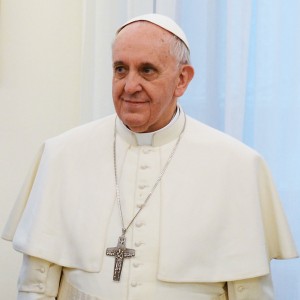 “Proclaiming Christ means showing that to believe in and to follow him is not only something right and true, but also something beautiful, capable of filling life with new splendor and profound joy, even in the midst of difficulties.”
“Proclaiming Christ means showing that to believe in and to follow him is not only something right and true, but also something beautiful, capable of filling life with new splendor and profound joy, even in the midst of difficulties.”
Okay, who is the author of this quote? The theologian of aesthetics, Hans von Balthasar, famous for identifying Truth, Goodness, and Beauty as the key divine attributes?
No, the author is Pope Francis, famous for his ministry to the poor and outcast.
This quotation is from Francis’s recent Apostolic Exhortation, a 224-page document called “The Joy of the Gospel.” As a genre, an “apostolic exhortation” exhorts the faithful to some particular action as a community. In “The Joy of the Gospel,” the Pope is exhorting us all to be evangelizers.
So what does beauty, in the Pope’s mind, have to do with evangelization?
“Every form of catechesis,” he writes, “would do well to attend to the ‘way of beauty’ (via pulchritudinis).” In fact, “Every expression of true beauty can be acknowledged as a path leading to an encounter with the Lord Jesus.”
I love what the Pope is saying in that last sentence, though I admit it’s pretty high in the clouds. Who, after all, can define what “true” beauty is? But Francis gradually brings his concept down to earth. Beauty is “a means of touching the human heart and enabling the truth and goodness of the Risen Christ to radiate within it.… So a formation in the via pulchritudinis ought to be part of our effort to pass on the faith.”
Then he gets very concrete, urging churches to utilize all the arts, both ancient and—yes—contemporary.
“We must be bold enough to discover new signs and new symbols, new flesh to embody and communicate the word, and different forms of beauty which are valued in different cultural settings, including those unconventional modes of beauty which may mean little to the evangelizers, yet prove particularly attractive for others.” (Does the Pope have a subscription to Image?)
Yet this isn’t all that Francis has to say about the arts. From the arts as we usually think of them (music, sculpture, poetry, and so on), he moves to what I’d consider the art of living. How can we live a beautiful life?
For Pope Francis throughout “The Joy of the Gospel,” it is closeness to other human beings that is the prerequisite for beautiful living. But not just physical closeness. There is a way of being with others that he spells out:
“We need to practice the art of listening, which is more than simply hearing. Listening, in communication, is an openness of heart which makes possible that closeness without which genuine spiritual encounter cannot occur. Listening helps us to find the right gesture and word which shows that we are more than simply bystanders. Only through such respectful and compassionate listening can we enter on the paths of true growth and awaken a yearning for the Christian ideal: the desire to respond fully to God’s love and to bring to fruition what he has sown in our lives.”
For Francis, this “art of listening” to others is enhanced by another art, the “art of accompaniment.” In what is one of my favorite passages from “The Joy of the Gospel,” he writes that we “can make present the fragrance of Christ’s closeness and his personal gaze. The Church will have to initiate everyone—priests, religious and laity—into this ‘art of accompaniment’ which teaches us to remove our sandals before the sacred ground of the other.”
Wow! Is this Pope a poet? That “fragrance of Christ’s closeness”: these words burst with the immediacy and sensual richness of poetry.
And Christ’s “personal gaze”? This is an image (and a reality) that I will sit with in meditation for many days, as I breathe in the fragrance of Christ’s closeness.
I will also meditate long on what the Pope does here with Exodus 3:5, where the Lord speaks to Moses, saying “Come no closer! Remove the sandals from your feet, for the place on which you are standing is sacred ground.”
From the sacred ground of God’s presence in Exodus, Francis moves seamlessly into “the sacred ground of the other”—seamlessly because Francis truly sees God present in every human being. (Will my meditation on Francis’s words lead me to see others as he does? I can only pray that this will happen.)
So this is how, for Francis, we evangelize:
We don’t preach.
We don’t even necessarily do good works.
We practice the art of listening with compassion and openness; we honor the other person as sacred ground; we find forms of beauty that will show Christ’s face to those who have not yet met him.
Peggy Rosenthal is director of Poetry Retreats and writes widely on poetry as a spiritual resource. Her books include Praying through Poetry: Hope for Violent Times (Franciscan Media), and The Poets’ Jesus (Oxford). See Amazon for full list. She also teaches an online course, “Poetry as a Spiritual Practice,” through Image’s Glen Online program.











